5 Proven Strategies to Build Your Credit Score
Your credit score is significant. Banks and other companies pull your credit report to get an overview of your financial health. They use your credit history to judge your ability to pay your bills on time now, so it's essential to clean up your credit report. If you are looking for , DoNotPay can help.
What to Look For in a Credit Report?
A credit report will tell you what you've spent, where, and how much you have (or should have) paid off. It can help you calculate your credit score if you need a loan or something. Here is what you'll find on a typical credit report:
| Your first and last name | If you’ve entered them on any credit card applications, this could also include any variations or misspellings of your name. |
| Your address | This may also include past addresses where you've received credit reports before. |
| Your employer | If you've provided employment information to any creditors, it will be included in the report. |
| Revolving accounts | These are credit card accounts or lines of credit you can regularly borrow from. |
| Installment loans | If you have a set loan for a car, your college tuition expenses, or a mortgage, this monthly payment information will appear on your credit report. |
| Open and closed accounts. | If you have a terrible account closed seven years ago, this will be deleted from your report. Accounts closed in good standing will remain on your information for at least ten years. |
| Your payment history | This is a history of payments for all accounts except those mentioned above deleted from your report. |
| Recent inquiries | These include any applications for loans or credit that you have made in the last year or so. |
| Collection accounts | If you have any unpaid debts sent to a collection agency, they appear here. |
| Public records | These include any information on bankruptcy, foreclosures, or other events that may have affected your credit history. |
Successful Ways to Build Credit Score
It can seem like an intimidating process to try and , but there are many things you can do.
Pay Your Bills on Time/Pay Down Debt
This may seem obvious, but you are only hurting your score when you make late payments or miss payments. Only paying the minimum balance on your credit cards doesn't hurt your score, but it takes longer to pay it off this way, causing you to pay more in interest. Also, the higher the amount of debt you owe compared to your current credit limit, the more this impacts your credit. Paying down debt, and making all of your payments on time, only helps in the long run.
Do Not Apply for Credit/Loans
Nearly every time you apply for a credit card or loan, banks will make a "hard inquiry" on your credit report. This gives them access to your credit report to decide on your application, and it usually has a somewhat negative impact on your score for a while. The amount of debt you owe can also negatively impact your credit score. If you are trying to raise your credit score, try not to apply for credit cards or loans, and your scores will gradually bounce back.
Experian Boost
Experian is one of the credit bureaus that furnishes your credit report. They recently launched Experian Boost, which can help you get credit for on-time payments of bills that do not traditionally appear on your credit reports, such as utility bills and streaming services. The service is free, so if you believe you are already making qualifying payments, it may be worth trying this service to help improve your credit score. You'll also get access to your free Experian credit report, FICO® Score, and credit monitoring and alerts.
Use Credit Building Debit Cards or Loans
Extra - Extra is a debit card linked to your bank account. They give you a spending limit based on your bank balance, so there is no credit check. When you use your Extra Card, they technically cover the purchase, and then it is debited from your account the next business day. They will report your qualifying transactions to the credit bureaus as credit-worthy payments each month. This can help you build your credit without hard inquiries or taking on more debt. There is no interest, but a monthly fee of $7+ per month, depending on the plan.
Self - The Self app helps you build or repair your credit. They do not make a hard inquiry on your credit report. They offer one or two-year loan repayment plans, but you do not get the money upfront like a traditional loan. Instead, the amount is deposited into a CD. As you make regular payments, it is reported to all three credit bureaus, which can help build your credit score over time. When the payment plan is complete, you get access to your money. The plans start at $25/month.
There are other products out there, but no matter what you choose, it is your responsibility to read the terms and services, understand all associated fees, and use financial tools responsibly.
Clean Up Your Existing Credit History
You are entitled to free credit reports, so use these to analyze your credit history. If you see incorrect information or accounts that do not belong to you, you can file disputes to have the information corrected or even removed. You can also request that derogatory remarks be removed from your account.
- File Disputes with TransUnion, Experian, and/or Equifax if you see incorrect information or accounts that do not belong to you. This may be particularly helpful if you've had financial fraud committed against you by a financially abusive partner or identity theft.
- File a Goodwill Removal Request Letter with creditors, asking them to remove old, paid, or almost paid off the debt. While it's not guaranteed, sometimes they will release negative marks as an act of goodwill.
- Submit a Debt Validation Request. Creditors cannot collect money while processing a debt validation request, and they must prove that the debt belongs to you and that you are legally obligated to pay it.
- Submit a Pay-to-Delete Negotiation Letter. You may be able to negotiate with creditors or collection agencies to have them remove bad debt in exchange for a partial settlement. If you have the financial means to pay off debt, this may be a reasonable option if you are trying to repair your credit report quickly because otherwise, collections and bad debt can stay on your credit report for up to 7 years or more.
What if You Are Unsuccessful?
If you have tried different and feel like it is too time-consuming or taking too long, you may be considering a credit repair agency or a financial advisor. While these are viable options, they can also take time and money and be stressful. DoNotPay offers another solution.
DoNotPay Has Ways to Build Your Credit Score
DoNotPay can help you build your credit score, specifically by helping you clean up your credit report. You don't have to worry about filing dispute forms or learning how to write the perfect negotiation requests because we do it all for you.
How to Clean Up Your Credit Report Using DoNotPay:
If you want to clean up your credit report but don't know where to start, DoNotPay has you covered in 3 easy steps:
- Search Clean Credit Report on DoNotPay.
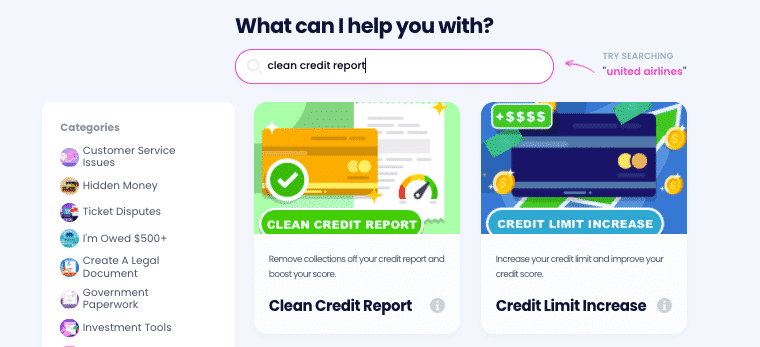
- Prepare a recent copy of your credit report that you can use as reference.
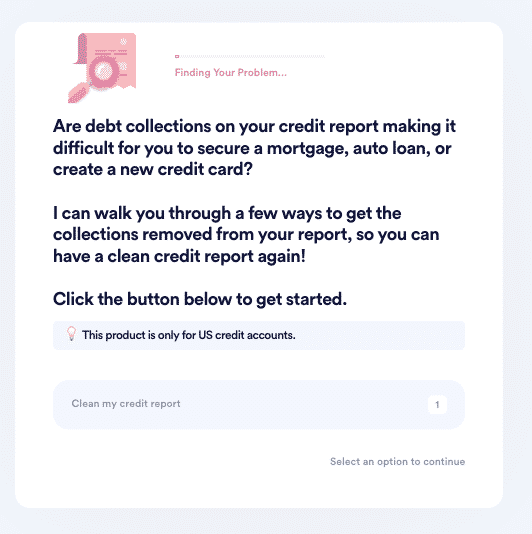
- Let us guide you through the 4 potential options:
- If you've already paid off your debt, we'll help you file a Goodwill Removal Request to get it removed.
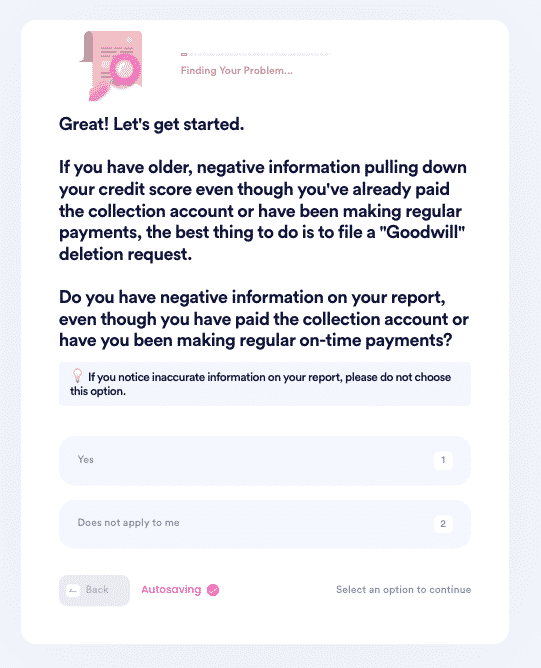
- If you notice any errors in your report (we have a list of common errors you can use.), we'll help you file a credit dispute with the creditor or major credit bureaus.
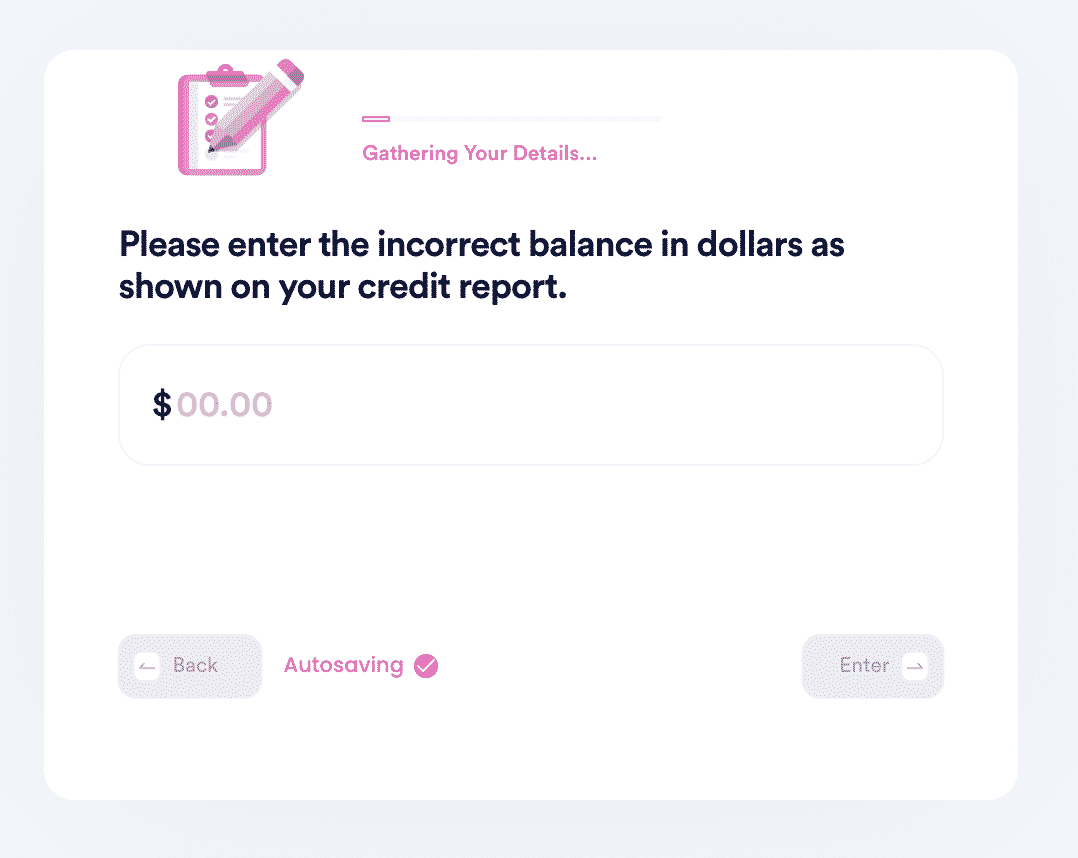
- If there are no errors, we'll check if you're still eligible to file a debt validation request. If they can't validate your debt, they're required to remove it from your report, and they can't collect it.
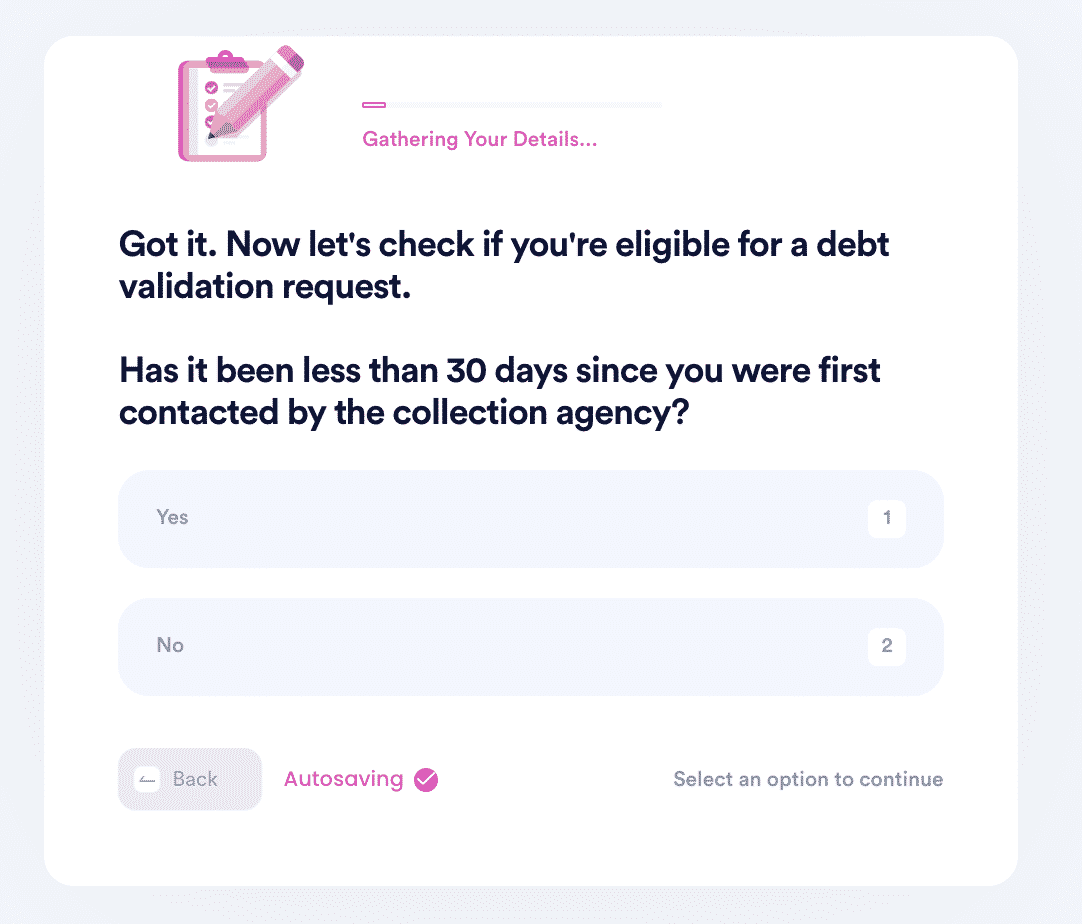
- Lastly, if none of the above options work, we'll help you file a pay-to-delete negotiation letter. You can customize the amount you are willing to pay in exchange for getting the item removed.
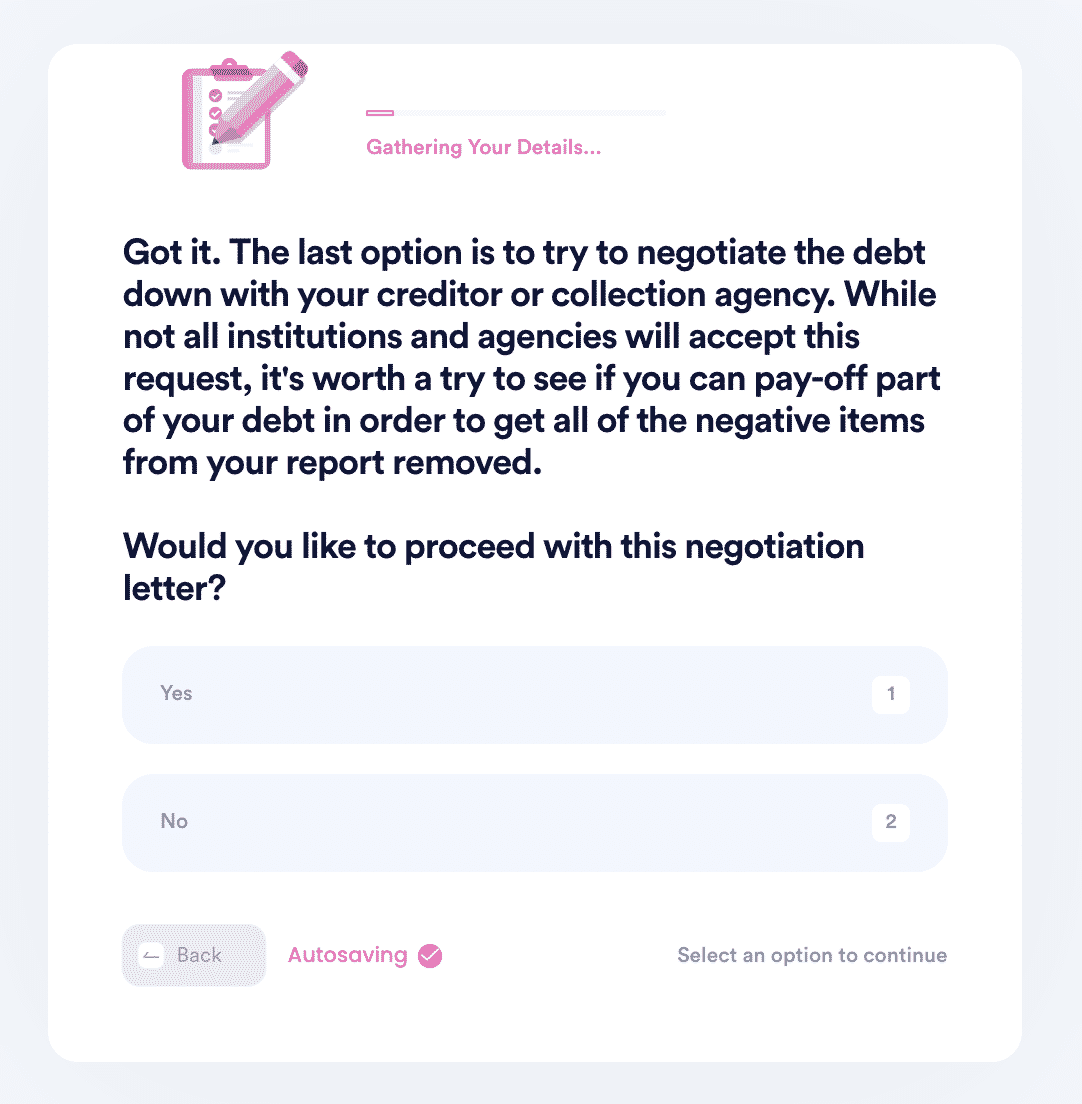
You can also check out our other credit products, including Credit Limit Increase, Get My Credit Report, Keep Unused Cards Active, and more.
Why Should You Use DoNotPay?
DoNotPay has a history of providing fast and easy service with successful results. We know your time is valuable, so you no longer have to spend it filling out online forms or writing and mailing letters. We see the process of building your credit score can be time-consuming and even frustrating, so DoNotPay takes care of as much as possible and makes the best case for you.
DoNotPay Can Help Repair Your Credit in Many Ways
DoNotPay can help you build your credit score by cleaning up your credit report. We can help you remove collections, write credit dispute letters, and pull hard inquiries for any bank or company. We have the experience to do it quickly, professionally, and successfully.
What Else Can DoNotPay Do?
DoNotPay can help you work on your credit and improve your financial situation in many ways, like:
- canceling subscriptions/services
- writing financial aid appeals
- helping with bills by making sure they get paid on time, or
- even helping you save money on your accounts.
This is only a fraction of what DoNotPay can do for you, so let us help you today.
 By
By